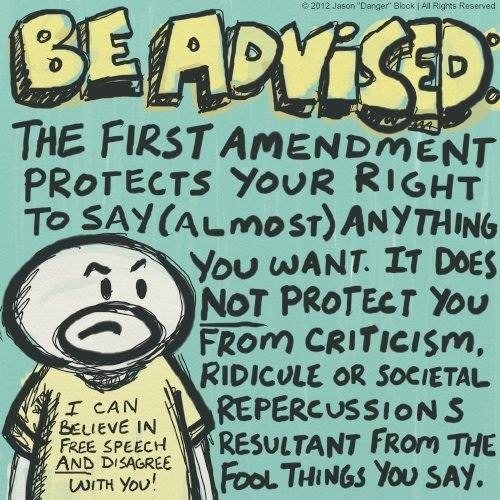It’s been a little over four years since I last wrote about capital punishment (i.e. the “death penalty”). There really isn’t a lot to be said about it. And since that time I’ve actually wavered a bit in my support for it, but not entirely. And I realize that in my libertarian views, it is a point of inconsistency, and I’ll explain why in a moment.
Recently, libertarian writer Julie Borowski posted a video called “Why You Should Oppose the Death Penalty” (embedded below, blog article here). And I don’t think she realizes her video could easily have been called “Why You Should Oppose the Criminal Justice System”, but let’s get into this.
She starts out the video talking about her history of supporting the death penalty, which is immaterial to the discussion. But she says what started to turn her away from it is when a friend pointed something out about it to her, “Okay Julie, so you’re cool with the government having the power to kill people?”
In actuality, her entire video should’ve revolved only around this question. This is really the only reason to not support the death penalty. Death is certainly quite serious, and we treat it seriously as well — and have for… well, forever. So giving a few people the power to, albeit only under certain, very limited circumstances, the power to kill people without penalty is certainly quite troubling.
And any person who wants to argue against the death penalty need only have that as their point of argument. Everything else, including most everything else in Julie’s video, is immaterial. Virtually every other argument she presents in her video I’ve already handled in my previous article on the topic, so I’m merely going to be doing a copy/paste job here to reply to them.
Many, many studies have shown no credible evidence that the death penalty deters crime.
I would not consider it unreasonable to expand the argument to say that the entire criminal justice system doesn’t deter any crime. All it takes is a moment to ponder this question: does a person typically consider the potential criminal penalties of an action before performing it, or not until after, if at all?
For a long time I assumed that the death penalty was cheaper than feeding and housing a prisoner for life. I was wrong. Turns out the death penalty costs taxpayers more than life in prison.
She goes on to give the details of this. Again, the details are irrelevant.
It also costs more to incarcerate a person for life than it does to parole them after 20 years, depending on the prisoner. Should we abolish mandatory life sentences without the possibility of parole?
If we start successfully arguing that certain punishments should not be allowed because of cost, eventually it’ll become that no punishment should be allowed because of cost. Instead of incarceration, perhaps just fine people for their crimes since that actually provides a positive revenue stream to jurisdictions instead of paying out to support prisoners while they are in jail.
Now a lot of you might be thinking that I’m arguing that such a statement about the costs of capital punishment is a slippery slope, and in a way it is. It is the only criminal sentence for which cost is actually brought up. No one argues about how much it costs to house a 21 year-old murder convict for the approximately 55 to 60 years it’ll take for that convict to die of natural causes, presuming average life span. And I’ve seen estimates that it costs about the equivalent of an average median household income per year per prisoner to keep them incarcerated, and the United States leads the world in the number of incarcerated persons per capita.
So why not just get rid of the entire corrections system, then? Imagine how much in taxpayer dollars that would save!
But then no one argues in that direction, because it would be considered certifiably insane to do so. Instead most people argue about what should be a crime (seeming mostly arguing in the direction of legalizing a lot of things that are crimes) and, once defined, what kind of penalty should go with it. But never is the cost of the penalty to the taxpayers ever really considered… until the topic turns to the death penalty.
More people are wrongly convicted than a lot of people might think. Just imagine being on death row for a crime that you didn’t even do.
Julie then goes on to point out the number of people who’ve been released from death row after having their convictions overturned and how terrible such a thing is. Miscarriages of justice do result in lost years for the innocent, and lost lives in the case of a wrongful execution. True there isn’t any way to truly know how many people were executed for a crime they did not commit.
But again, such an argument can again be used against the entire penal system. You might as well say that those who’ve been released from prison, as contrasted from death row, due to new evidence surfacing means that the entire penal system should be abolished.
The fact that the prisoner was on death row is irrelevant to the argument. They were incarcerated by the State following a conviction by a jury of their peers in a Court of law, meaning the jury weighed the evidence presented to them and returned a verdict of Guilty.
Evidence later surfacing that provides the reasonable doubt necessary for a conviction to be set aside isn’t a problem with capital punishment, but with the criminal investigation. The only thing that capital punishment brings to that party is an implied time limit. I say “implied time limit” because there is not any limit on when a person can have their conviction overturned or vacated to the best of my knowledge. The only difference is whether the person will be alive when that happens.
Indeed recently there has been a push to seek a new trial for George Stinney. Stinney was 14 years old when he was convicted of killing two white girls and executed in the State of South Carolina in 1944.
But the notion also applies equally to individuals not sentenced to death, as the person incarcerated could die unexpectedly in jail, whether on death row or not, or might expire during a life sentence before new evidence surfaces that allows the conviction to be vacated.
And yes, there have been cases where a person’s conviction has been posthumously vacated where the person in question died in prison. In 2000 convictions for murder against four members of the Patriarca crime family were overturned. The conviction was secured in 1968, and by the time the conviction was overturned, two of the men had expired in prison.
Miscarriages of justice are unfortunate, but abolishing the death penalty will not eliminate them, and there is nothing to suggest that the occurrence will be reduced. And using miscarriages of justice as an argument against one criminal penalty means that same argument could, in theory at least, be used against all criminal penalties.
Again if you’re going to argue against the death penalty, the only argument anyone, libertarian or otherwise, need employ is simply that the death penalty is the government having the power to kill people without penalty. And following on a common libertarian argument, if it is not legal for one person to kill another, it should not be legal for the government to do the same. And while a person has the ability to claim self defense, the government does not.

 In response to the suspension, conservatives and Christians in the US are blowing things way, way, way, way out of proportion. If you listen to any Christian conservative, you’d think that A&E somehow nullified everyone’s First Amendment protected right to free speech. Sorry, cousin, but that not only did not happen, it is not possible. Free speech is not in danger, but
In response to the suspension, conservatives and Christians in the US are blowing things way, way, way, way out of proportion. If you listen to any Christian conservative, you’d think that A&E somehow nullified everyone’s First Amendment protected right to free speech. Sorry, cousin, but that not only did not happen, it is not possible. Free speech is not in danger, but
You must be logged in to post a comment.